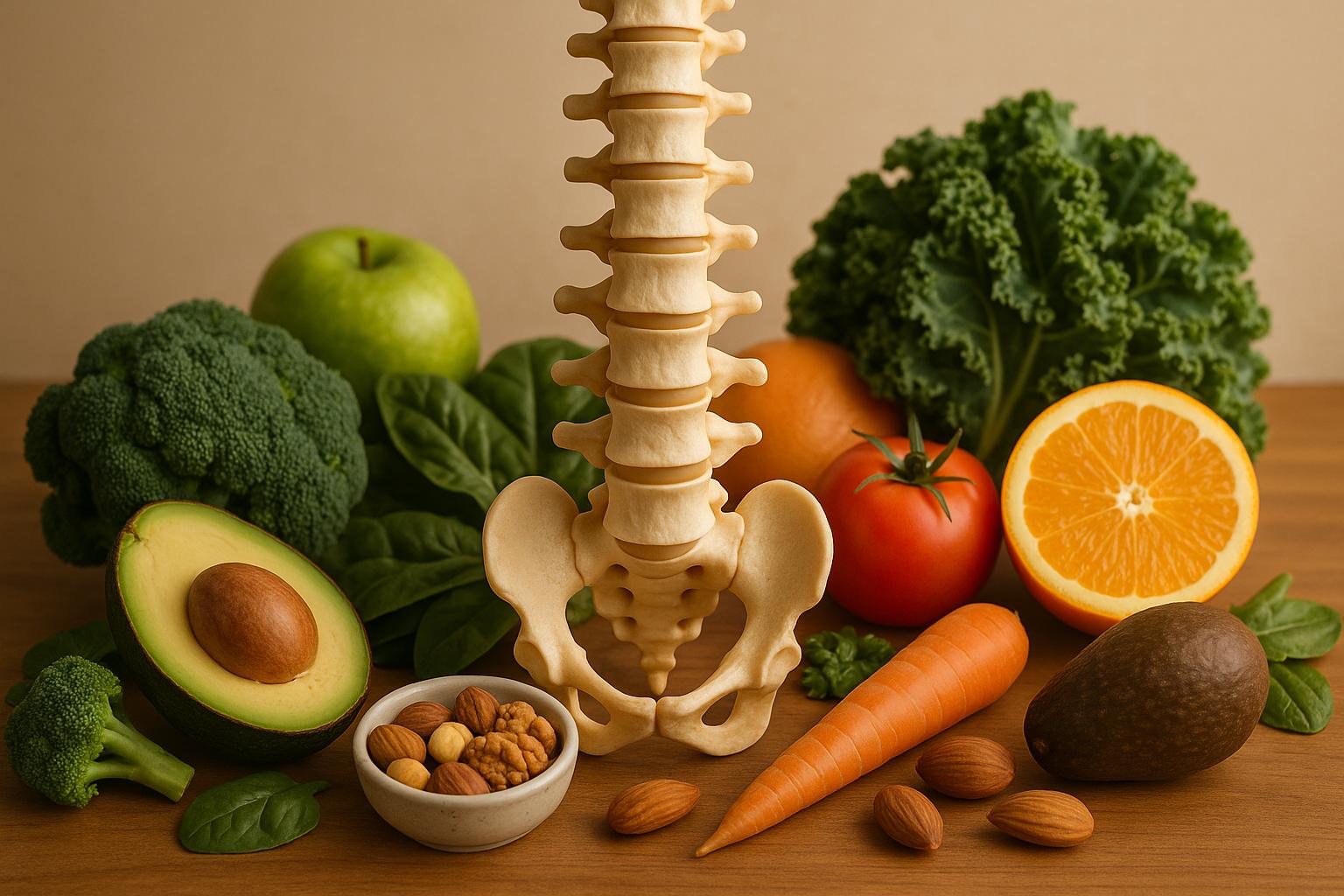Your spine’s health depends on proper nutrition. Without essential nutrients like vitamin D, calcium, magnesium, and B vitamins, your bones, discs, and muscles can weaken, leading to chronic pain and degeneration. Poor diet also triggers inflammation, worsening back pain and mobility issues. Certain groups, such as older adults or those with restrictive diets, are more vulnerable to these problems.
Key takeaways:
- Vitamin D and Calcium: Support bone strength and repair.
- Magnesium and B Vitamins: Aid muscle relaxation, nerve function, and pain regulation.
- Inflammation: Nutritional deficiencies can amplify swelling and tissue damage.
- Targeted Nutrition: Combining dietary changes with supplements improves spinal health.
Addressing these gaps with personalized nutrition plans and therapies can reduce pain and promote long-term spinal health.
Key Vitamin Deficiencies Causing Your Back Pain
Key Nutrients for Spinal Health
The spine relies on a steady supply of vitamins and minerals to maintain its structure, repair itself, and support nerve function. When these nutrients are lacking, it can disrupt bone health and even lead to chronic pain.
Vitamin D and Calcium
Vitamin D is essential for helping the body absorb calcium effectively. Without enough vitamin D, calcium absorption slows down, interfering with the natural bone repair process. This imbalance can weaken the vertebrae, making back pain more likely.
Calcium itself is a cornerstone of bone strength. It keeps the spine’s structure intact and supports ongoing repair. If your diet doesn’t provide enough calcium, your body may struggle to maintain bone density, which can accelerate degenerative changes in the spine.
Magnesium and B Vitamins
Magnesium works hand-in-hand with vitamin D, activating its functions in the body. It also helps muscles relax and supports proper nerve function. A magnesium deficiency can lead to increased muscle tension and heightened nerve sensitivity, both of which can worsen back pain.
B vitamins – specifically B1 (thiamine), B6 (pyridoxine), and B12 (cobalamin) – are critical for healthy nerve function. They assist in producing neurotransmitters that regulate pain signals. Without adequate levels of these vitamins, nerve health can suffer, leading to heightened pain perception and discomfort in the spine.
Trace Elements for Spinal Support
While vitamins and major minerals often take the spotlight, trace elements also play a role in maintaining spinal health. Emerging research suggests these elements contribute to the health of cartilage and connective tissues. The relationship between nutrients is highly interconnected, meaning a deficiency in one can impact the effectiveness of others. However, more studies are needed to fully understand how these trace elements influence spinal integrity.
These nutrients collectively create the foundation for a healthy spine, highlighting how deficiencies can lead to pain and degenerative changes over time.
How Nutritional Gaps Cause Spine Pain and Degeneration
When the body doesn’t get enough essential nutrients, the spine becomes more prone to pain and degeneration. What starts as minor discomfort can progress into chronic conditions, highlighting the importance of proper nutrition for maintaining spinal health. Let’s dive into how specific nutrient deficiencies play a role in spine-related issues.
Chronic Low Back Pain and Degenerative Disc Disease
Certain nutrient deficiencies – like those of vitamin D, calcium, and magnesium – can directly weaken the spine’s structure and function. For instance, low levels of vitamin D are closely linked to degenerative spine disease, chronic low back pain, and even muscle spasms. Without enough vitamin D, the body struggles to manage inflammation and oxidative stress in the intervertebral discs. This speeds up cell aging, increases cell death, and worsens pain in the neck and back. Adding to this, an imbalance in electrolytes caused by low vitamin D can intensify discomfort.
Calcium deficiency is another key issue. When calcium levels drop, the body compensates by pulling calcium from the bones, weakening the vertebrae and raising the risk of osteoporosis. This becomes even more problematic when paired with low vitamin D, which hinders the body’s ability to strengthen bones and increases the likelihood of fractures.
Magnesium is just as important. A lack of magnesium has been linked to chronic, unexplained back pain [7]. Magnesium is critical for proper muscle function, and when levels are low, muscle contractions can become irregular [7]. Additionally, magnesium deficiency disrupts the activation of vitamin D, reducing calcium absorption efficiency and further compounding spinal issues.
The Role of Inflammatory Processes
Magnesium deficiency doesn’t just affect muscles – it also plays a role in inflammation. Low magnesium levels can cause calcium channels to remain open longer than they should, activating N-methyl-D-aspartate (NMDA) receptors. This triggers an inflammatory response, as the excess calcium inside cells promotes cytokine production, which contributes to spine pain. On the flip side, vitamin D helps counteract inflammation by lowering the release of cytokines and prostaglandins, offering some relief.
sbb-itb-d9e542d
Evidence from Supplementation and Dietary Interventions
Research continues to highlight how targeted nutritional strategies can support spinal health and alleviate pain. Both supplementation and thoughtful dietary changes play a role in improving spinal integrity and managing discomfort.
Clinical Studies on Supplementation
Clinical trials have shown promising results with specific supplements. For example, vitamin D supplementation has been linked to reduced spine pain and slower degeneration, particularly in those with low vitamin D levels. Similarly, B vitamins have been found to ease nerve-related pain, while collagen peptides help improve disc hydration and reduce stiffness, leading to better spinal mobility.
Dietary Sources vs. Supplements
Whole foods remain a vital source of essential nutrients, often providing additional compounds that aid absorption. For instance, you can find vitamin D in fatty fish, fortified dairy products, and egg yolks. However, supplements offer a more concentrated dose for those who struggle to meet their needs through diet alone. Nutrients like calcium, magnesium, and B vitamins from food also provide critical cofactors that support bone strength and nerve function.
In many cases, combining dietary improvements with supplementation yields the best results. Supplements can quickly address specific deficiencies, while a nutrient-dense diet ensures long-term nutritional balance. Together, these approaches form a comprehensive strategy for maintaining spinal health and reducing discomfort effectively.
Treatment Approaches to Spinal Health
Addressing spinal health effectively involves combining personalized nutrition with targeted therapies to tackle both systemic and structural issues contributing to spine pain. These strategies aim to fill nutritional gaps while addressing the root causes of spinal dysfunction.
Personalized Nutrition and Lifestyle Plans
Personalized nutrition creates diet plans tailored to an individual’s genetics, lifestyle, and health conditions. It starts with a thorough nutritional assessment, which examines eating habits, lifestyle factors, and specific health concerns to identify deficiencies. For example, a study revealed that 93% of 150 patients at a university-affiliated inner-city primary care clinic with persistent, non-specific musculoskeletal pain had low levels of vitamin D.
Based on these assessments, patients receive customized dietary advice and, when necessary, high-quality supplements. Supplements such as omega-3, vitamin D, and magnesium are often recommended to address bone loss, inflammation, and muscle weakness. Patients are also educated on anti-inflammatory foods and sustainable habits to support long-term spinal health.
Treatment Therapies at Kinnection Clinic

At Kinnection Clinic, therapies target both nutritional deficiencies and spinal misalignments. The clinic employs Gonstead chiropractic care, which focuses on precise spinal adjustments informed by detailed assessments, including digital X-rays and specialized diagnostic tools, to improve alignment and function.
Functional medicine is another cornerstone of the clinic’s approach. By using detailed lab tests and health evaluations, this method identifies underlying causes of spine pain, such as inflammation, hormonal imbalances, or nutrient absorption issues.
To complement nutritional interventions, the clinic addresses biomechanical stressors that contribute to spinal deterioration. For patients with absorption challenges, IV therapy delivers nutrients directly into the bloodstream, ensuring optimal availability of essential vitamins and minerals. These custom nutrient infusions are designed to meet individual needs effectively.
Regenerative medicine options like PRP (platelet-rich plasma) and peptide therapies promote tissue repair and disc regeneration at a cellular level. When combined with proper nutrition, these treatments enhance the body’s ability to heal itself naturally.
For patients with hormone-related bone density issues, the clinic may suggest hormone replacement therapy using bioidentical hormones. This can be particularly beneficial for postmenopausal women and men with low testosterone, helping to strengthen bones and maintain spinal integrity.
Kinnection Clinic’s comprehensive approach combines personalized nutrition plans, detoxification support, and lifestyle changes to create tailored treatment strategies. By addressing each patient’s unique nutritional and structural needs, the clinic aims to promote long-lasting spinal health and overall well-being.
Conclusion: Addressing Nutritional Gaps for Spinal Health
There’s a clear link between nutritional deficiencies and spine pain. When your body doesn’t get enough key nutrients like vitamin D, calcium, magnesium, and B vitamins, the health of your bones, discs, and surrounding tissues can suffer.
To maintain a healthy spine, focusing on a targeted nutritional plan is crucial. Effective spinal care starts with identifying specific deficiencies, addressing any absorption issues, and combining these nutritional strategies with physical treatments. Studies show that personalized approaches often help those dealing with ongoing musculoskeletal pain regain balance and function.
The best results come from combining nutritional support with structural treatments. This approach doesn’t just mask symptoms; it tackles the root causes of spine pain, promoting true healing.
Nutrient testing plays a vital role in creating personalized therapies that help the spine recover and stay strong. The goal isn’t just short-term relief – it’s about creating a solid foundation for long-term spinal health and reducing the risk of future problems.
Your spine’s health reflects your nutritional well-being. When nutritional gaps are identified and managed, the benefits extend far beyond temporary relief, offering lasting improvements in spinal function and resilience.
At Kinnection Clinic, personalized nutrition works hand-in-hand with evidence-based Gonstead chiropractic care to support lasting spinal health and vitality.
FAQs
How can I tell if a nutritional deficiency is impacting my spine health?
Nutritional deficiencies can have a big impact on the health of your spine. If you’re concerned about this, it’s a good idea to talk to a healthcare provider. They can run blood tests to check for key nutrients like vitamin D, calcium, and magnesium, which are essential for keeping your bones strong and your spine supported.
Some common warning signs of deficiencies that might affect your spine include muscle weakness, fatigue, and bone pain. To help fill any nutritional gaps, try adding more nutrient-packed foods to your meals. Think leafy greens, fatty fish, nuts, seeds, and fruits or vegetables with high water content. If necessary, your healthcare provider might also suggest supplements or other treatments based on your individual needs.
What dietary changes can help improve spine health and reduce pain?
To help your spine stay strong and reduce pain, include plenty of calcium-rich foods in your diet. Think dairy products like milk and cheese, leafy greens such as kale and spinach, or fortified plant-based options. Don’t forget about vitamin D, which you can get from fatty fish like salmon or tuna, and egg yolks. Together, these nutrients are vital for keeping your bones strong and guarding against spinal wear and tear.
Adding more anti-inflammatory foods to your meals can also make a big difference. Focus on fruits, vegetables, whole grains, lean proteins, nuts, and seeds. These foods are packed with nutrients that help ease inflammation, support muscle health, and aid in tissue repair – all of which are essential for a healthy spine and pain management.
Tweaking your diet in these ways can go a long way in supporting your spine and boosting your overall health.
What are the potential risks or side effects of taking supplements for spinal health?
While supplements can contribute to spinal health, they aren’t without potential risks or side effects. For instance, taking fish oil or flaxseed supplements in high doses might increase the risk of bleeding. Similarly, consuming large amounts of certain vitamins, like C or E, could lead to gastrointestinal issues such as nausea or diarrhea.
Some supplements may also interact with medications or cause other unwanted effects. This is especially true for herbal products, which are often less regulated. Overusing supplements can result in minor problems like digestive discomfort or headaches. To ensure safety and effectiveness, it’s always best to consult a healthcare professional before adding new supplements to your routine.



